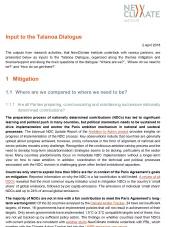The Climate Action Tracker (CAT) with this paper is pleased to have the opportunity to provide input to the Talanoa Dialogue. Climate Action Tracker assesses countries’ mitigation targets and actions and aggregates them at the global level. This submission focuses on global results, country level information is available on climateactiontracker.org.
Summary:
"Where are we" compared to "where do we want to go"?
- The majority of NDCs assessed by the CAT are not in line with a fair contribution to meet the Paris Agreement’s long-term warming limit.
- Global GHG emissions need to peak around 2020 to meet the Paris Agreement’s 1.5oC warming limits.
- The full implementation of current Paris Agreement commitments (NDCs) would lead to median global temperature increase in 2100 of 3.2°C, and the currently implemented national policies lead to a temperature increase in 2100 of 3.4 °C.
"How do we get there?"
- All key sectors—energy generation, road transport, buildings, industry, forestry and land use, and commercial agriculture—have to begin major efforts to cut emissions so that total global emissions start to decline by, latest, 2020.
- The electricity sector needs to undertake the fastest transformation and must be fully decarbonised by 2050.
- In the transportation sector zero-emission passenger vehicles need to reach a dominant fleet share by around 2035 and all new sales must be zero-emissions by then.
- In the building sector, all new buildings be fossil-free and near-zero energy by 2020 and that building renovation rates are increased from less than 1% in 2015 to 3-5% by 2020.
- The industry sector needs to shift to the most efficient and least emissions-intensive production methods, with all new installations built with the best available low carbon technology standards from 2020 onwards.
- For the agriculture sector reducing emissions through changes in farming practices alone will not be enough, but changing our diets and reducing food waste could make significant additional reductions, which calls for a much more holistic approach.




